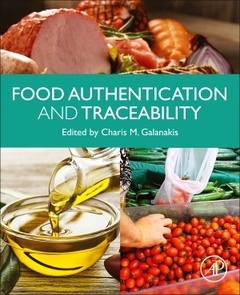Description
Food Authentication and Traceability
Coordinator: Galanakis Charis M.
Language: English
Subjects for Food Authentication and Traceability:
Keywords
?(bio)markers; Adulteration; Ambient mass spectrometry; Analytical techniques; Authentication; Authentication techniques; Authenticity; Chemical imaging; Chemometrics; Country of origin; DNAFoil technology; Exploratory ta analysis (EDA); Fingerprinting; Food; Food adulteration; Food authentication; Food authenticity; Food chain; Food fraud; Food profiling; Food supply; Food traceability; Foodomics; Fraud; Gas and liquid chromatography; Genomics; Halal authentication; Inductively coupled plasma-mass spectrometry; Isotope ratio mass spectrometry; Labeling requirements; Legislation; Lipidomics; Livestock identification; Meat; Metabolomic approaches; Metabolomics; Microbial communities; Mislabeling; Multivariate analysis; Multivariate method validation; National standards; Nonhalal food; Nonkosher food; PCR–DGGE; Pig derivatives; Polymerase chain reaction; Profiling; Promising technologies; Protected designation of origin; Protected geographical indication (PGI); Proteome; Proteomics; Quality assurance; Radio frequency identification tags; Safety and quality issues; Scientometric evaluation; Screening methods; Substitution; Technical evaluation; Traceability; Unsupervised and supervised pattern recognition methods
414 p. · 19x23.3 cm · Paperback
Description
/li>Contents
/li>Biography
/li>Comment
/li>
1. Food authentication: Introduction, techniques and prospects 2. Food Fraud 3. Chromatographic methods 4. Mass Spectrometry in Food Authenticity and Traceability 5. Chemical Imaging in Food Authentication 6. Non-targeted fingerprinting approaches 7. DNA-based techniques 8. Omics-based technologies for food authentication and traceability 9. Proteomics for food authentication 10. Future challenges on the use of blockchain for food traceability analysis 11. Regulatory aspects 12. Metabolomic approaches
- Includes information on blockchain for food traceability analysis
- Discusses consumer preferences and perceptions regarding food traceability drivers and food fraud
- Presents approaches of authentication for food of animal origin and omics-based technologies
These books may interest you

Innovative Food Analysis 146.54 €


